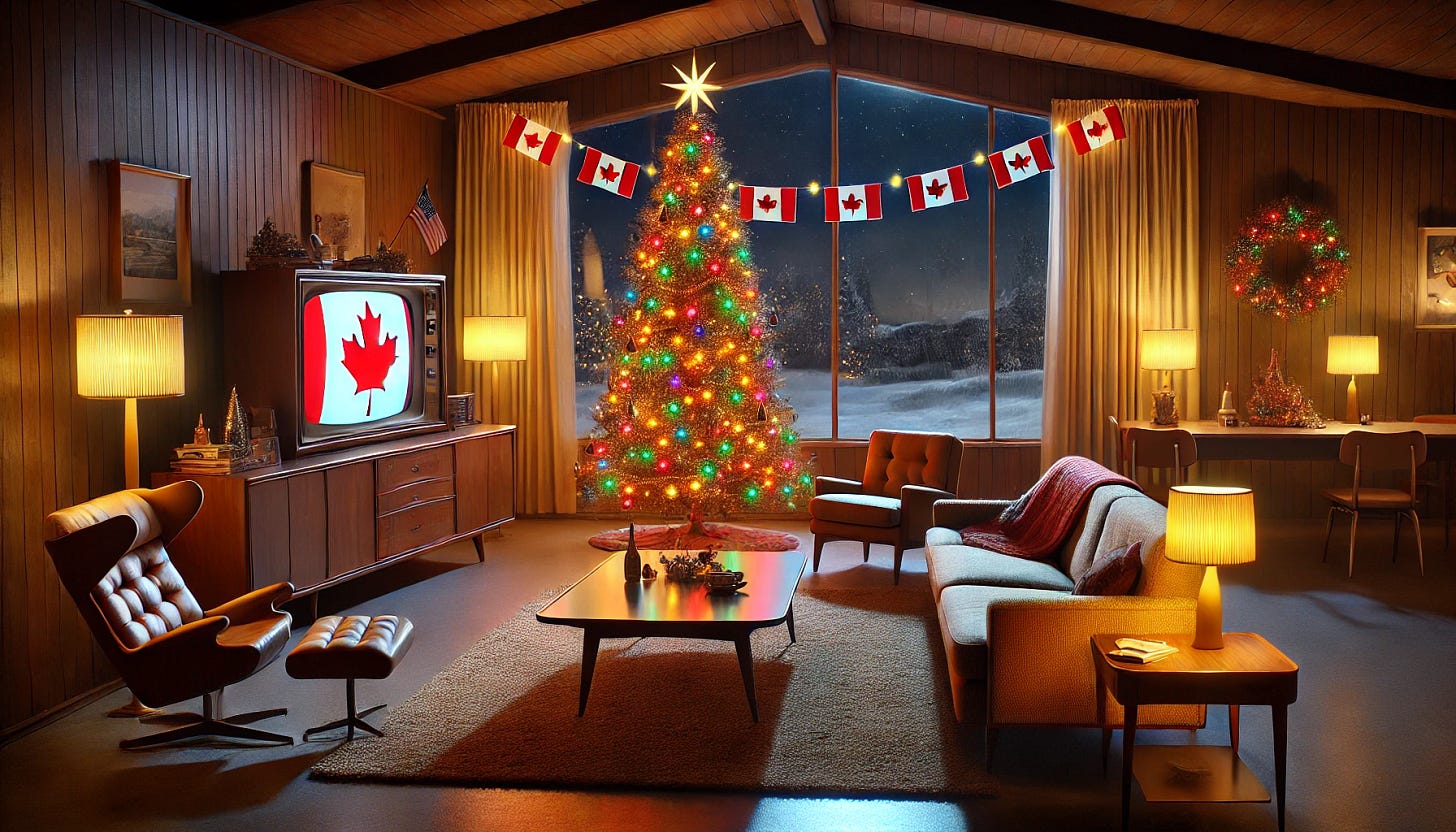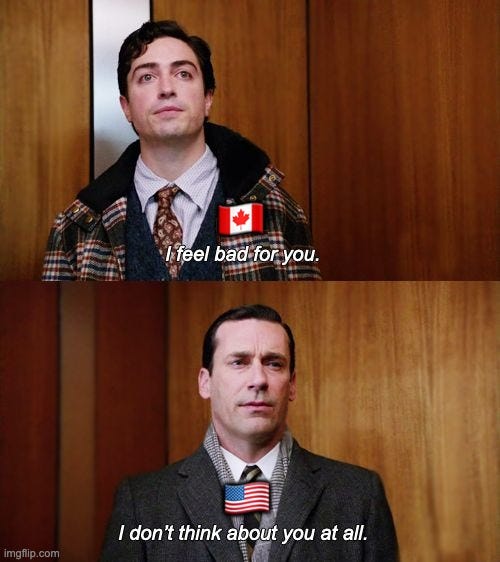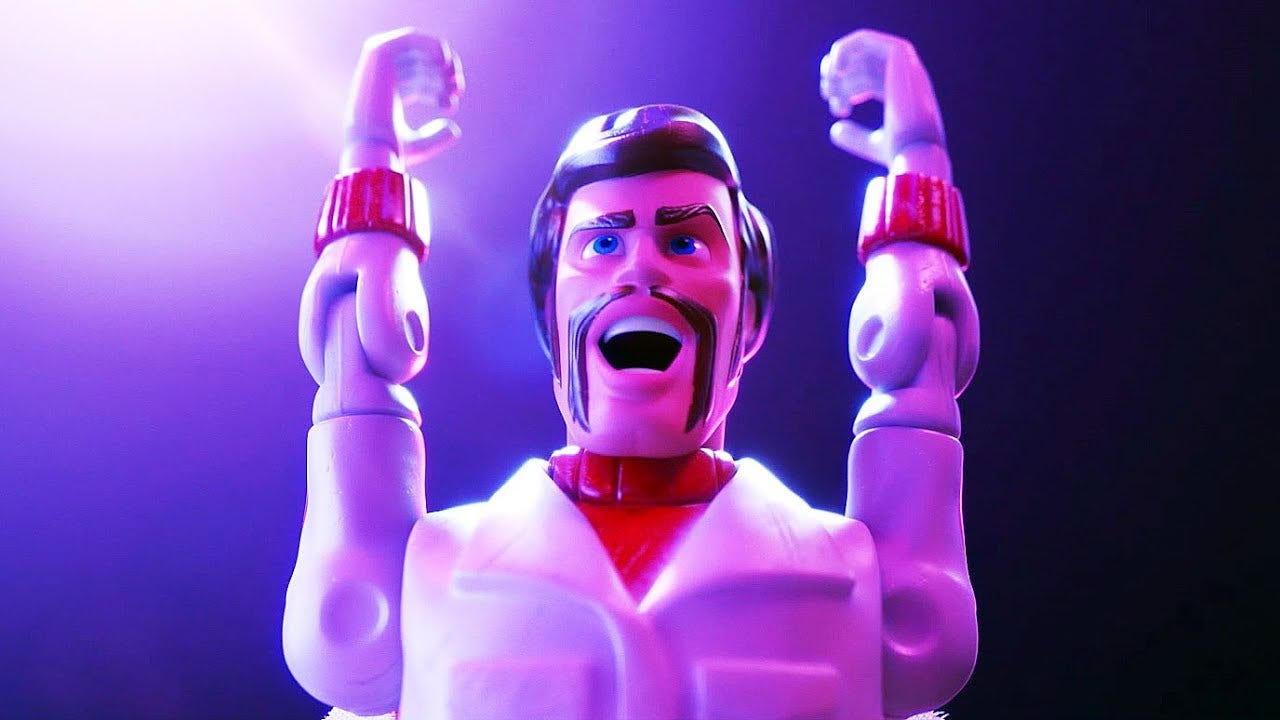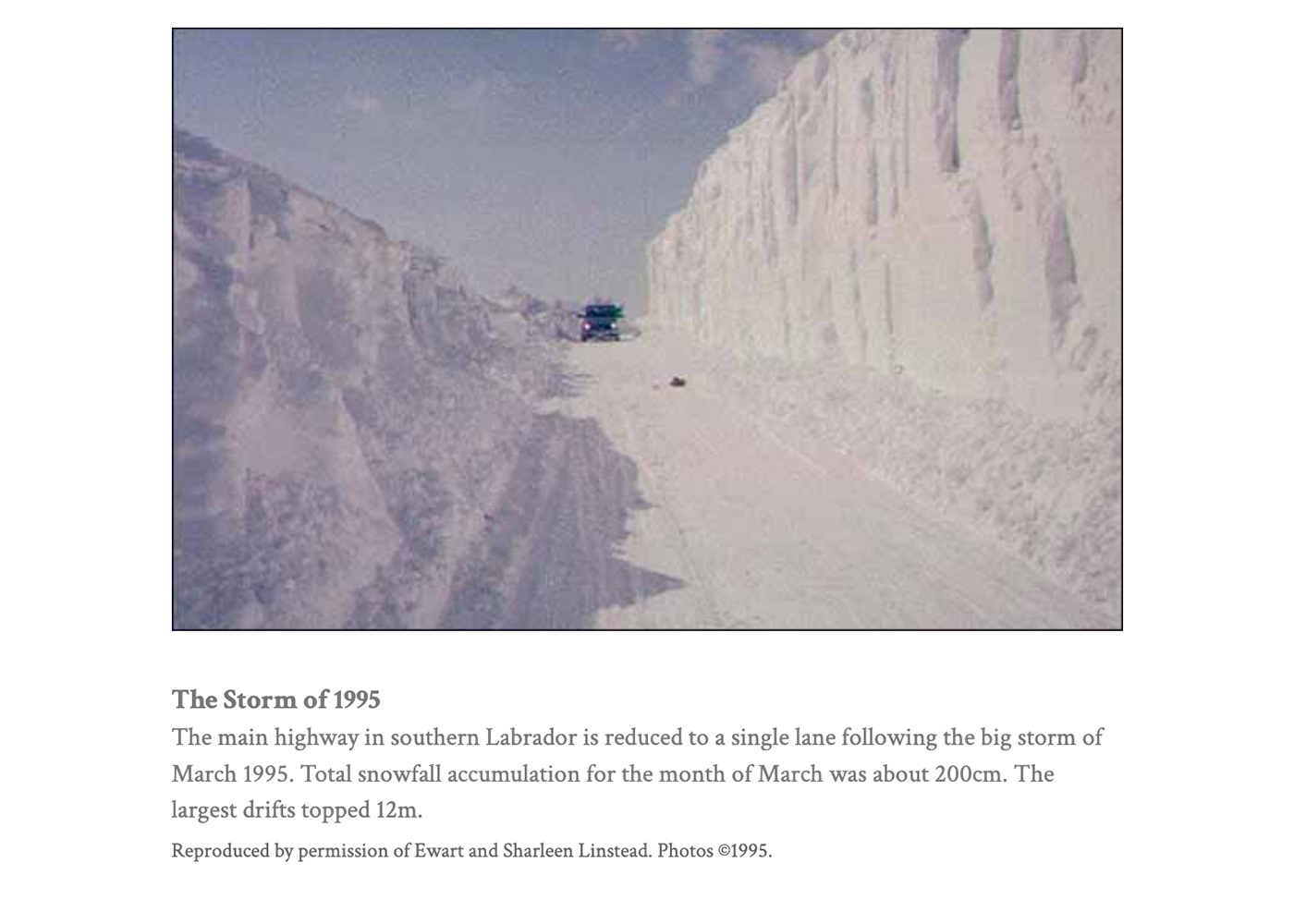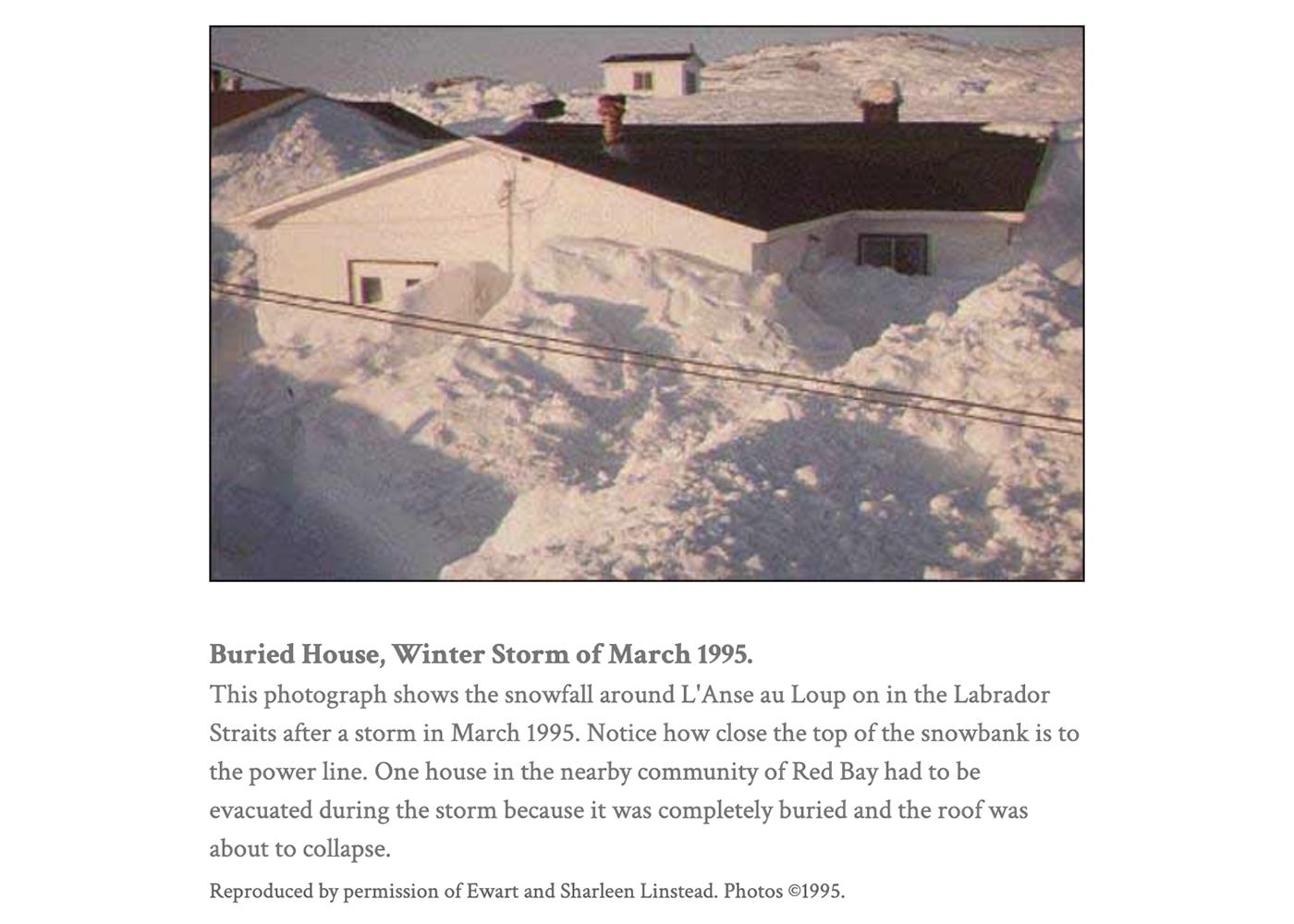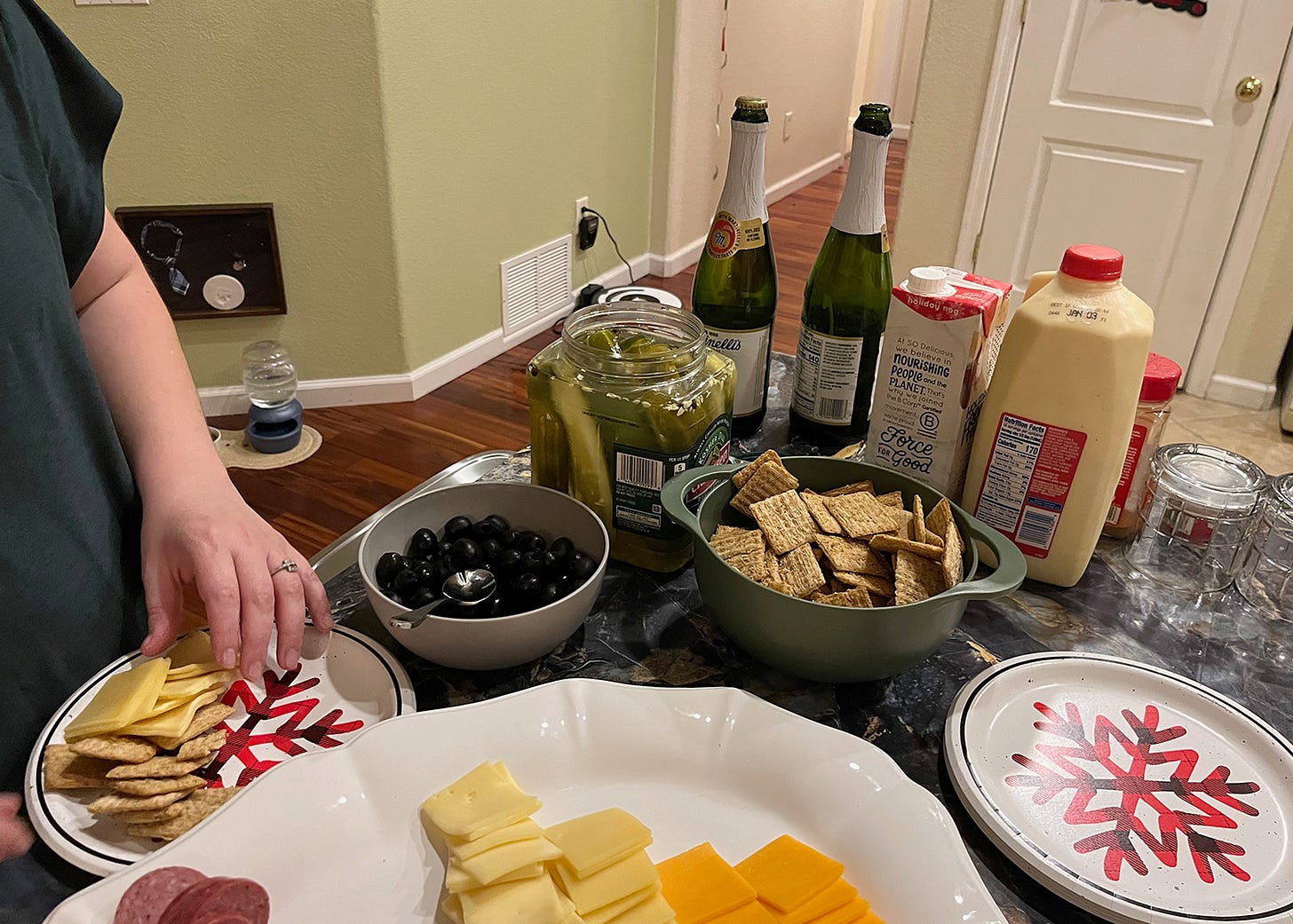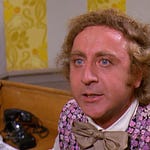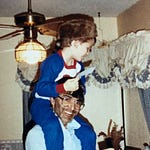Think fast: when I say “Canada,” what immediately comes to mind?
If you’re like many people who are only familiar with some of the most basic, obvious stereotypes of North America’s coldest country, you might immediately start imagining giant evergreen trees, massive mountains, loads of snow, and rodents of unusual size (beavers, that is).
Above and beyond its rugged, natural landscape, though, you might also think of some of its more symbolic elements: the Maple Leaf flag, these weird things called “Provinces,” coins with Queen Elizabeth on them, hockey, of course, and, if you’re aware of the weird foods they eat above the 49th parallel, deep fried pickles, poutine (french fries covered in cheese curds, and brown gravy), and ketchup chips.
But if you’re like me, and probably a few hundred million other Americans, when you think of Canada, well… nothing comes to mind. Because you don’t think of Canada basically ever.
I hate to offend the good people from the Great White North, but pretty much all day, every day, I don’t even remember that Canada exists.
It’s like that meme I see on the internet from time to time, taken from the TV show Mad Men, where two men are in an elevator. The younger man says: “I feel sorry for you.” The older man says: “I don’t think about you at all.”
That’s what Canada is like for me. Sometimes, I’ll be clicking around on the internet, reading a breaking news story about a tragedy unfolding in America in real time, perhaps something involving guns or private health insurance, or guns AND private health insurance.
Random people with Canadian flag emojis in their profiles will start commenting about how infinitely superior their country is to mine. And that’s when it will hit me…
“Oh yeah! Canada exists! Canada is a thing! I completely forgot about Canada! I’ll be darned.”
Now, I will give our frozen friends a point here: they are indeed the superior country… in precisely one manner: they are literally above us. But only literally.
Canada is superior to America in the same sense that Lake Superior is superior to the other Great Lakes. That is to say, it is above Lake Michigan, Huron, Erie, and Ontario.
But that’s it.
As far as the nation of Canada being superior to the nation of the United States of America? Don’t make me laugh. The USA has an economy that is almost 13 times larger than Canada’s, and three of our states have a larger GDP than their entire country (that’s California, Texas, and New York, in case you wondered).
And although we have almost the exact same amount of raw land as each other, just the state of California matches Canada’s entire population, still leaving us with 49 states to spare.
So… where was I? Oh yeah, Canada exists, and I forget that sometimes. That’s right.
Now, to be clear, I have nothing against Canadians personally, and every Canadian I’ve ever met has been delightful. But it’s such a weird phenomenon: I almost never find out their true nationality until after I’ve known them for a while.
Over the years, it’s happened to me a few times where I have a friend, or perhaps a coworker, and he or she (let’s say he, in this case) is just an all-around great guy, and we get along just fine. Then weeks, or perhaps months later, the truth about this guy’s identity eventually surfaces, and it’s always jarring when it does.
Finding out that someone I know is Canadian is kind of like finding out someone I know has spent time in prison. It’s not necessarily something they should be embarrassed of, but it’s still such a shock when I find out about it. You know?
Many times, I’ve had conversations that go something like this:
Me: “Wow, he’s Canadian?”
Someone else: “Yep. Crazy, huh?”
Me: “Yeah, but he seemed so… normal.”
Someone else: “I know. You wouldn’t be able to tell just by looking at him.”
Me: “Why didn’t he tell me himself? I feel weird now that I know the truth.”
Someone else: “Yeah, I wouldn’t mention it if I were you. Might be awkward.”
Okay, I’m kidding… but only halfway.
First of all, I am kidding about being surprised because Canadians are actually easy to spot from a distance. Not because of how they look but because of how they talk.
Every man or woman I’ve met who came from the Land of Loons fails two basic American shibboleths:
They say “Eh?” a lot. (And don’t ever let them gaslight you and tell you they don’t, because they absolutely do. This is not just a stereotype—it’s the truth.)
They pronounce their “Oh” sounds really funny. They say: “aboat” instead of “about,” “prow-cess” instead of “process,” and so on.
If I were an American soldier in an old black-and-white war film, and it was up to me to determine who the good guys and bad guys were without having the benefit of spies or special technology, and if we were somehow assuming that the Americans and Canadians were at war (with each other — I know this is a really big stretch, but just go with it), I’d make every soldier line up and give them a test.
“Okay everybody, one at a time, repeat after me: ‘Oh, I’ve got a round about process for brewing beer.’”
Down the line, I’d go, listening to each man repeat my test phrase until, eventually, one man would say:
“Oh, I’ve got a roaned aboat prohcess for brewing beer, eh?”
Knowing I’d got my man, I’d ask one more question to be sure: “Is that right? You do?” and he’d do himself in:
“Oh, yeah, you betcha.”
Boom! Canadian: bad guy! It would be so easy. They can’t hide.
Second of all, I’m not kidding about being surprised because aside from those verbal tics that give them away, Canadians pretty much look and act like us in America. And almost all of the Canadians I’ve ever met—I met here.
They’re here because they left Canada to come to America. Which, of course, makes me wonder, “If Canada’s so great, why did you come down here?”
But when I do meet folks like this, I don’t even think of asking such normal-looking-and-acting people: “Hey, are you actually from here?” I just assume they are, like everybody else. And they pretty much are like everybody else: they fit in just fine.
What does all this have to do with Christmas? Hold your mooses; I’m getting to that.
Canada is… an interesting place. It’s been in the news quite a lot recently. Right now, as I write this, there’s a huge buzz online about the USA potentially taking steps to annex Canada and make it the 51st American state.
There’s so much talk and cross-talk about it that I can’t even tell fact from fiction anymore. I don’t know who first suggested it, but it sounds like some people in America think this is a hilarious joke, while others think it’s a serious suggestion.
It also sounds like a small minority of people in Canada welcome this idea, as far-fetched as it may be, while many more think that it’s a very bad idea and insist that it’s not even funny to joke about something this serious at all.
Which, to be honest, makes it even more hilarious. The more they keep saying it isn’t funny, the funnier it gets. (And on a side note, when did Canadians, the people who have given us some of the funniest comedians in the world, lose their sense of humor?)
So, to recap: my point here is that Canadians are a funny people who talk funny, and who used to be funny in the past but right now really aren’t all that funny, at least when we say funny things back to them.
THE DRAMA!
O, Canada! America’s hat… where the people drink milk from plastic bags and live in their hoases doan by the moantains… perhaps someday our 51st state… a country so easy to make fun of.
All right, all right… so maybe I’m too harsh on Canada.
Maybe I am sometimes guilty of directing an unfair amount of ridicule to the country that is home to Dudley Do-Right and his fellow Mounties, those wacky policemen who ride on horses and wear muskrat fur stetson hats and scarlet tunics.
Maybe I am too fond of teasing the people who still somehow claim allegiance to the monarchy of the United Kingdom in one of the strangest, most antiquated acts of useless nostalgia an American could possibly imagine.
Maybe I am biased against a nation where every single government document and official communication in the entire country must be spoken and printed in both English and French, despite only 3% of the population outside Quebec speaking French as a first language.
But c’mon, Canada, you make yourself too easy a target!
Bringing up Quebec is a perfect example: while America is currently joking about taking Canada in as another state, Quebec is still very seriously just waiting for its chance to finally declare independence from Canada once and for all.
You hear that? Not even Canada wants to be part of Canada!
Quebec has been trying to leave Canada for 45 years and just barely missed achieving total independence in 1995, with a vote that lost by one-half percent!
(Note: If Quebec were granted independence today, Canada would immediately lose 23% of its population. That is the exact same percentage the USA would have lost if all the Confederate States had won the Civil War and successfully seceded from the Union. Can you imagine?)
Okay, enough ragging on Canada. Let’s say Canada is actually a wonderful place and is home to some really great things—things to be proud of. Things that I can point to today and say: “I have to give Canada credit for that.”
To that end, I tried an experiment to find out what those things would be. I asked an AI chatbot what things in my life it could pinpoint that I have personally benefitted from, have, hold, use, or eat, etc., that are clearly, conclusively, and uniquely from Canada or Canadians.
The results were… interesting. At first, it gave me a list of 10 things that were mostly irrelevant. Things like:
Hockey: Obviously, it’s Canadian, but I don’t play it.
William Shatner: Wow, really? The actor? I had no idea. Are you sure he’s actually Canadian and he’s not just a prisoner?
The Canadarm: The big giant grabby arm thingy used in the NASA space shuttle.
Okay, these were true, but this was getting ridiculous. None of these things had anything specifically to do with me. I refined my parameters and tried again.
Maple Syrup: Okay, you got me there. I love real maple syrup. I’m a big fan, although I’m pretty sure most (or all) of the maple syrup I buy comes from Vermont or New Hampshire, but still, I’ll concede a half point.
The Blackberry Smartphone: Wow, this one was a surprise. I did indeed own a BlackBerry Curve 8310 once upon a time—it was my very first smartphone. I had no idea the Blackberry was from Canada, so they definitely get a point there.
Insulin: Well, I’m not diabetic, and neither is else anyone in my family, but I have had friends with diabetes over the years. So, I guess I can be thankful that Canada gave us insulin, especially in the event that I should ever develop diabetes in the future. So, I’ll give them half a point here as well.
In all, my AI chatbot experiment didn’t convince me that there’s anything directly or explicitly in my life that I have, hold, use, or eat that I can give full and complete credit to Canada for.
But wait…
You know what? Now that I think about it more, there are a few things that I have to give Canada credit for. Yes, digging much deeper into my memory banks and thinking more abstractly, I can actually come up with at least three on my own.
YES, I CANADA!
The first is Rush, the rock band from Toronto. I first discovered Rush when I was 18 years old, and from the very first time I heard the song “Tom Sawyer,” I was totally hooked. I liked them so much that I gave my firstborn son “Rush” as a middle name. So I can give Canada credit for my son’s name. Although he only hears his middle name when talking to government officials or when he’s really, REALLY in trouble.
The second is the memories I have from my trip to Canada I took when I was in my teens. I went on a canoeing trip in British Columbia when I was fifteen, and that’s when I discovered just how beautiful nature can be.
I think the most breathtaking outdoor scenery I’ve ever seen anywhere in my life was the wilds in and around Bowron Lakes Provincial Park, where we spent two weeks canoeing through glacier-fed lakes and portaging through muddy mountain trails. (And this is where I learned about ketchup chips and poutine.)
On a side note, this trip was also where I discovered just how snippy some Canucks get when you say “American.” At a McDonald’s on our very first day in Canada, I told the lady behind the counter: “I only have American money. Is that okay?” She seemed remarkably offended by this and snapped at me.
“We’re Americans TOO, you know!”
No, I did not know. That didn’t make any sense to me at all.
She was Canadian; I was American. What was she even talking about?
My country was literally called “The United States of America.” Her country, which I had to leave “America” to visit, was literally called “Canada” and definitely not called “America.” (Well, again, that is until it becomes the 51st American state.)
I felt this was exceptionally weird, so I asked some of the adults in my group what her deal was. They discerned that perhaps she meant that Canada is part of NORTH AMERICA, the continent.
Oh man… that was just so dumb and pedantic.
Seriously, do Mexicans want to be called “Americans” too because they’re also a part of the North American continent? If so, I’ve never met anyone from Mexico who has ever asked for that.
Either way, I learned that a better way to phrase this was, “Do you take ‘U.S. currency?’” — This somehow placated people despite the hilarious fact that while we both technically use “Dollars,” my American—err—U.S. Dollars are worth more than their Canadian Dollars.
So, fine. Knock yourself out, Canadian McDonald’s lady: I’ll agree that you’re an American just like me if that makes you happy. But I’m the one laughing: I only had to pay 64 cents of my dollars for every one of her dollars.
Not bad, eh?
The third is the biggest and the main point that I’ve been slowly building to this whole time but keep getting distracted: CHRISTMAS!
That’s right. There is, in fact, one big, huge, enormous thing that is a major part of my life that I have to give total and complete credit to Canada for, and that is the Stauffer Family’s Christmas Eve Tradition.
The funny thing is, I didn’t even make the connection until a week or two ago. With all this talk about Canada in the news and the upcoming Christmas season, I finally put two and two together for the first time.
So, you want to hear the story about the Canadian tradition of eating food on the floor at Christmas time and how my American family has done this since before I was born?
Okay. Here goes.
In 1964, my grandpa, Ron Stauffer, a fighter pilot in the U.S. Air Force, was stationed at the Ernest Harmon Air Force Base in Newfoundland and Labrador to help work on America’s Distant Early Warning Line, which would protect us from sneak attacks from Soviet bombers.
He was transferred there from Langley Air Force Base and took along his wife and children, including my dad, Ron Stauffer, his firstborn son.
Although they only lived there for two years, the stories my dad and my uncles have told us over the years are truly amazing and, at least to me, sometimes terrifying.
I heard stories about the mind-numbingly cold weather: something like 20 degrees below zero in the winter and up to 40 degrees below with the wind chill.
I heard about so much snow falling that the roads would sometimes have walls of snow up to 9 or 10 feet high on the sides.
I heard about snow piling up so high it would sometimes cover up the sides of a house so you couldn’t even open your door, and it would reach all the way to the rooftop, so kids could jump off or ride their sleds off the roof into the snow, safely, just a few inches below.
I heard about nighttime being so cold that people who had to drive to work in the morning would have to use a “block heater” (whatever that was) to keep their car engine from freezing up (whatever that meant) and, failing that, how some people would even let their car run in their driveway all night long in order to ensure that they could actually drive it away the next morning.
I heard about how my uncles would throw snowballs at each other and hike around in the nearby forests and joke about how they were running away from “Newfies” — the local people they almost never interacted with. (Being Americans stationed on a military installation didn’t offer much in the way of interaction with locals).
I heard about seafood being so cheap and plentiful that sometimes, they nearly had it coming out of their ears. My grandmother would have freezers filled to the brim with giant glass jars of frozen lobster meat — much more than they could eat.
Aside from all the seafood, Newfoundland sounded like a horrifying place to me—about as bad as I could possibly imagine, and I couldn’t understand how any human being would ever choose to live there.
Maybe for my dad and his brothers, it was a blast, but I don’t like snow or cold and never have, so no amount of tobogganing down a hill behind the house would make me want to live there.
The fact that Newfoundland was an island where you couldn’t drive away from it in a car, even if you wanted to, made it that much worse.
However, there is one thing that Newfoundland gave my family that I will forever be grateful for, and it all started, in fact, due to that legendary, hostile, frozen weather.
In late December 1964, the weather was so awful due to a massive snowstorm that the Air Force told everybody to stay in their homes and not leave. Being confined in the house didn’t seem like such a big deal, though, since it was Christmas Eve, and Grammy and Grandpa had preparations for a special family Christmas dinner.
The boys and my grandparents, the family lore goes, were preparing for dinner, listening to the “Merry Christmas” album by Johnny Mathis. The Christmas tree was decked out in jolly fashion, and everyone was in a great Christmassy mood.
Then, all of a sudden, in the howling snowstorm, the house lost electricity.
Everything went dark. The lights went out. The oven shut off. The music stopped.
Grandpa found a flashlight and took out a small transistor radio he’d gotten in Japan when he had been stationed there before and tuned it to the local station to listen for weather updates, music, and whatever else they could get on this one tiny little device.
Well, now, Christmas was about to be completely ruined. Without power, the oven didn’t work, nor a microwave (if they even had one), so Grammy couldn’t even finish baking whatever she had planned for dinner.
But that was okay; they just reverted to “Plan B” — pulling out all the cold foods from the fridge that didn’t need to be heated. Bread, meat, cheese, pickles, olives, crackers, cookies, and more.
They wouldn’t let Christmas Eve be canceled by a little thing like losing power.
Lighting candles and finding flashlights, they sat at the table while Grandpa tried to heat a pot of beans over the candle’s flames. When that didn’t work, he gave up, and they just resigned themselves to only eating cold food.
Now, for whatever reason, situations that adults might call a “crisis” often come across to children as exciting and magical, and this was one of those moments. My dad, for whatever reason, came up with a brilliant idea.
“Hey, Mom and Dad, can we go sit on the floor over by the Christmas tree… and eat our food there?” he suggested.
And for whatever reason, they obliged. So, the family moved dinner from the table to the living room floor. Sitting in a circle on the ground, with candles lit and the lights out, their dinner of simple, cold snacks from the fridge began.
Right after they started, however, just as suddenly as it had gone out, the electricity came back on. The whole house instantly lit up again. My grandparents, being the adults in the room, of course, said: “Hooray! The lights are back on. Now we can go back to the table.”
But the boys were having too much fun.
“Nooooo!” my dad pleaded with them. “Please, turn the lights back off! This is cool—let’s stay here and keep eating on the floor!”
So, Grammy and Grandpa agreed and turned off the lights again so they could keep having Christmas Eve dinner on the floor around the tree. But since the electricity had returned, they could augment their candlelit evening: the Christmas tree was now fully lit with mini-lights, and the turntable worked again, so they could turn the music back on.
Once again, Johnny Mathis was singing “O Holy Night” while the kids chomped down on their “whatever we could find in the fridge” dinner, and the candles flickered into the night.
The next year, still living in Newfoundland, the electricity worked just fine, yet when Christmas came around, my dad asked once again: “Can we have Christmas Eve on the floor again?” and at his insistence, Grammy and Grandpa decided that what was once a response to a catastrophic weather event could now become an annual event.
And so it did. On Christmas Eve, 1964, a family tradition began entirely by accident in Newfoundland, Canada. And that tradition has continued to this very day, when, on Christmas Eve 2024, four generations of Stauffers spread across the United States of America will spend Christmas Eve eating on the floor for the 60th year in a row.
This special way of celebrating Christmas is so ingrained in my mind and habits that when I was younger and found out that some people didn’t eat Christmas Eve dinner on the floor, I wondered, “What’s wrong with them?”
For me and my siblings, Christmas Eve is actually the most wonderful time of the year, to the point where Christmas Day is actually boring in comparison.
It’s funny: when you grow up doing things a certain way your entire life, it’s easy as a child to assume that everybody else does, or, if they don’t, you find what they do to be inferior.
When I found out that other people don’t do much to celebrate Christmas Eve, but instead, their big day is Christmas Day, and they celebrate it by eating dinner at the table, I thought, “Wow, that’s just… lame.”
So, over the years, from the day I was born until today, I have spent Christmas Eve sitting on the carpet near our Christmas tree, just like those early days.
Everyone in our family does it slightly differently. At my parents’ house, we usually had sandwiches made with “Dutch crunch rolls” filled with pastrami and melted Swiss cheese.
Since I got married, my wife and I usually don’t go to the elaborate lengths of making fancy sandwiches but mostly serve basic cold finger foods like hard salami, Triscuits, olives, pickles, sliced Cheddar, etc.
One thing that’s certain, though, is we still all always drink Martinelli’s sparkling apple cider, and we always play Johnny Mathis at every get-together, no matter whose house it is. Many of us also play “Home For Christmas,” an album by Amy Grant, which is a close second in terms of Christmas albums. And, of course, we’ve gone from playing vinyl LPs to CDs to now streaming MP3s on Apple Music.
What’s funny about this is that over the years, I’ve noticed that when people outside our family learn about our floor-sitting tradition, they’re intensely curious about it, and some people I know who aren’t Stauffers have even copied it.
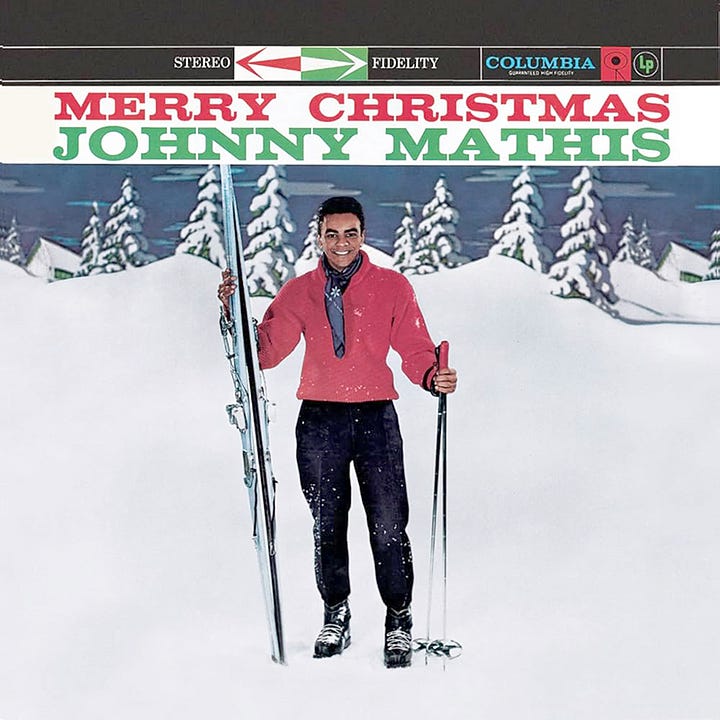

A few years ago, my wife was part of a women’s bible study, and as Christmas came near, the leader asked everyone to share what their family’s special traditions were, if they had any.
My wife told the room, almost embarrassed, about how we eat on the floor by the tree (I say “embarrassed” because, if you don’t have enough time to fully explain how this came to be and how it actually works, “eating on the floor for Christmas” can sound really strange).
But the response from the ladies in the room was almost over the top. “Oh, wow! That sounds so cool!” they said. One woman even told her: “I want to try that!”
A few weeks after Christmas, that same woman—a single woman who had never been married, had no children, and had always lived alone—did indeed try it… all by herself.
She was thrilled to report back to my wife: “I did it! I had Christmas Eve dinner on the floor by my Christmas tree! It was so fun!”
How funny.
How funny that sixty years ago, on one random night during the Christmas season, the power went out across the city of Stephenville on the island of Newfoundland.
And now there are dozens—and perhaps soon to be hundreds—of Americans who are still enjoying fantastic family holiday memories, and making new ones, because of it.
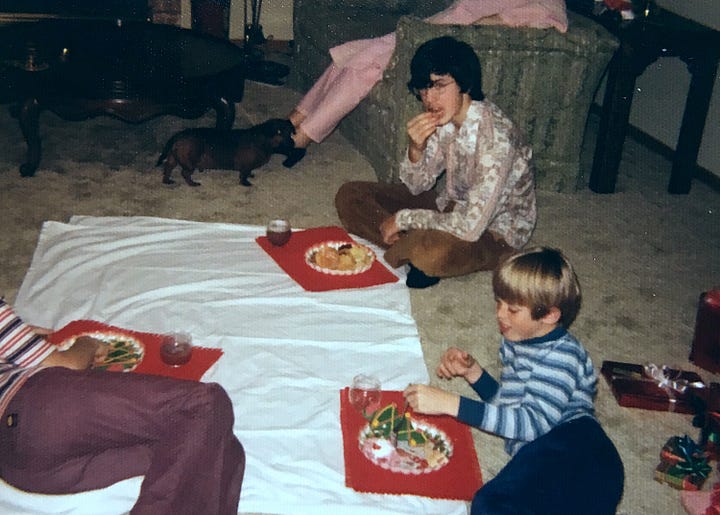
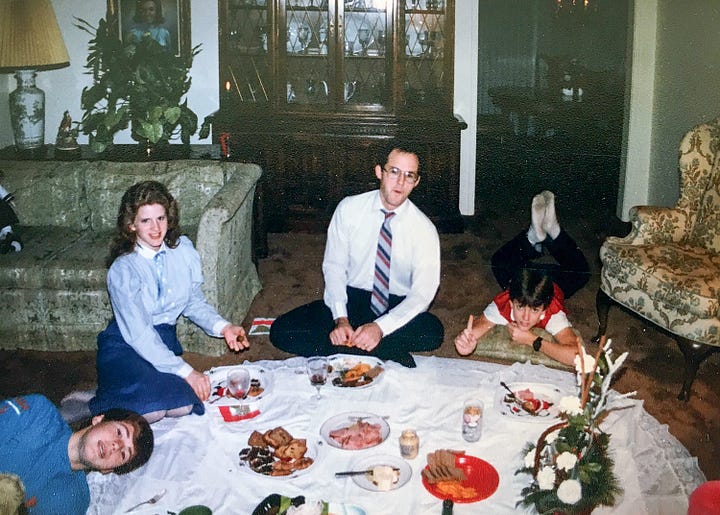
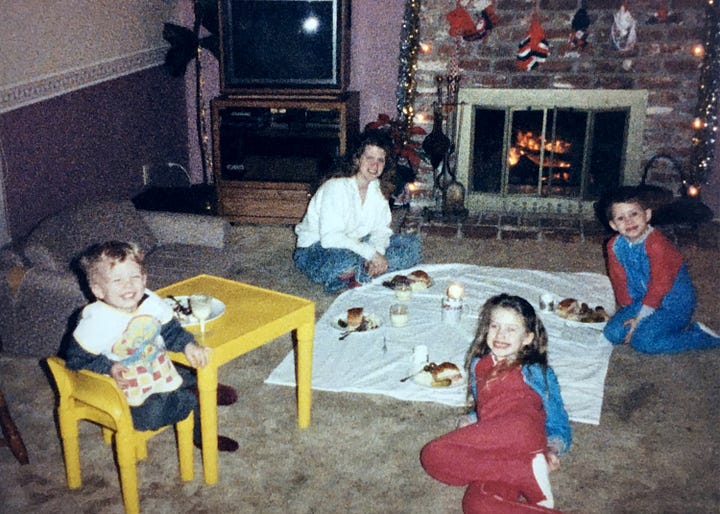
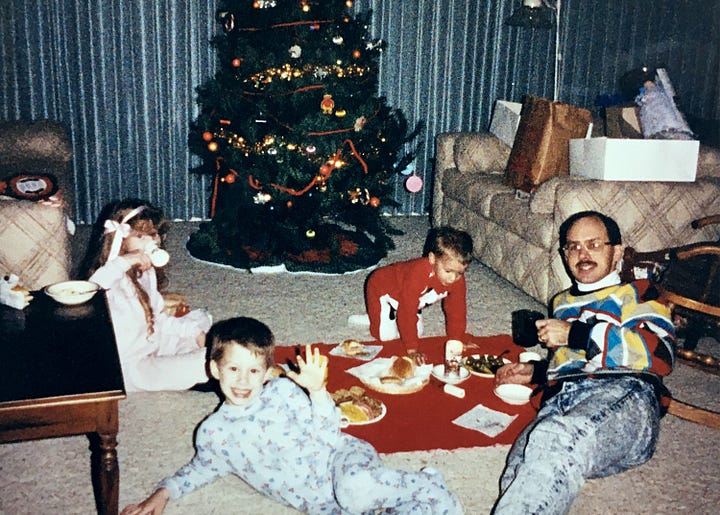
When I hear the song “It’s the Most Wonderful Time of the Year,” I can’t help but smile when I hear the lyrics: “There’ll be scary ghost stories and tales of the glories of Christmases long, long ago.”
For that’s precisely what we do every Christmas. Aside from watching “The Muppet Christmas Carol,” there are no scary ghost stories in our house… but each year, as we gather around the tree, sitting in a circle, someone, a young child, a family guest, or a new addition to the Stauffer family, will ask: “So what’s this all about anyway? Why are we sitting on the floor?”
And I’ll smile as I once again tell the “tales of the glories of Christmases long, long ago,” where it all began.
So, thank you, Canada. You’ve given my family over half a century of wonderful, unique holidays and special, happy memories.
Merry Christmas, eh?




